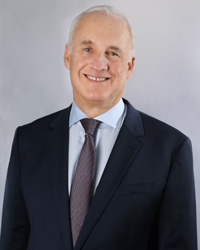Strategic Public-Private Partnerships
NREL's strategic public-private partnerships develop high-impact, multiyear, multisector collaborations that drive transformation of domestic and global energy landscapes.
The partnerships bring together governments, communities, utilities, industry leaders, manufacturers, distributors, federal agencies—including the U.S. Department of Energy—and more.

Innovation and deployment at unprecedented speed and scale are required for clean energy transformation in the United States and around the world. Clean energy transformation requires coordinated, holistic, whole-systems solutions. We need not only continuous improvement of individual technologies but also highly efficient, flexible, integrated systems solutions across our full energy economy that can only be realized through creative partnerships.
To achieve these large, rapid, transformational objectives, we need formal structures and an intentional approach—strategic public-private partnerships provide just that structure and approach. NREL brings expertise as a convener and decades of experience collaborating with partners across all sectors to accelerate new technologies, integrate energy systems, and implement solutions at scale.
Active NREL Strategic Public-Private Partnerships
Accelerating Clean Energy at Scale
To move from energy ambitions to actions, communities need in-depth energy-sector expertise and insight. NREL offers unbiased, best-in-class analysis and modeling capabilities supported by decades of scientific and applied research, expertise, and partnerships. We support a vision for rapid, widespread transition to clean, affordable, equitable, secure, and resilient energy systems.
Autonomous Energy Systems
Future energy systems will require secure, autonomous, and reliable communications, control, and interoperability among millions of distributed generation points and billions of buildings, vehicles, and more. NREL created the concept of autonomous energy systems to enable design of intelligent and robust solutions for operating highly electrified, heterogeneous energy systems. Autonomous energy systems will help utilities, communities and technology providers effectively manage the growth of distributed resources while simultaneously accelerating the transition to the low-emission, intelligent energy systems of the future.
Global Power System Transformation Consortium
The Global Power System Transformation Consortium supports power system operators by ensuring they receive technical and engineering knowledge at the speed and scale required to support the global energy transition. The consortium provides coordinated and holistic "end-to-end" support and knowledge infusion to these operators as well as those in academia, government, and business and other stakeholders to create advanced, low-emission solutions.
Sustainable Aviation
New technologies are changing the future of aviation by providing actionable pathways for lowering greenhouse gas emissions in a sector that is among the most difficult to decarbonize. NREL has instituted a comprehensive, coordinated sustainable aviation strategy that paves the way for research, development, demonstration, and deployment—leading to solutions for decarbonizing aviation. NREL's sustainable aviation research aims to not only permanently lower the carbon intensity of flight but also fundamentally improve the carbon footprint, mobility, and resiliency of the entire aviation ecosystem.
Team


Bill Brown
Strategic Adviser, Strategic Public-Private Partnerships
Bill Brown is an entrepreneur, banker, lawyer, and educator with extensive experience in energy finance and innovation. In his role as senior adviser of NREL's strategic public-private partnerships, he helps build large-scale partnerships to transform energy economies across the globe.
Brown is co-founder, executive chair, and chief technology officer of 8 Rivers Capital LLC, which develops and deploys sustainable, infrastructure-scale solutions to achieve net-zero emissions. Previously, he was professor and senior lecturing fellow at Duke University School of Law; a leader in the sales and trading areas of Morgan Stanley, AIG International, and Goldman Sachs; and a law partner at Sidley Austin. He serves on the Sustainable Markets Initiative of the Prince of Wales, Duke University School of Law Board of Visitors, and the President's Council for Resources for the Future.
Brown earned two Bachelor of Science degrees from the Massachusetts Institute of Technology and his Juris Doctor from Duke Law School, where he sat on the editorial board of the Duke Law Journal.

Richard Kauffman
Senior Adviser, Strategic Public-Private Partnerships
Richard Kauffman is chair of Generate Capital, a leading financier and owner of clean economy infrastructure, and chair of the New York State Energy Research and Development Authority. He is an adjunct senior research scholar at Columbia University's Center on Global Energy Policy.
Kauffman oversaw New York's energy agencies as its first chair of Energy and Finance from 2013 to 2019 and was senior adviser to Secretary of Energy Steven Chu. Other past roles include CEO and president of Good Energies Inc.—a leading investor in clean energy technologies—a partner at Goldman Sachs, and vice chairman of Morgan Stanley's Institutional Securities business. He serves on boards for the Wallace Foundation, Altaba (formerly Yahoo! Inc.), and Stanford University's Precourt Institute for Energy. He is a member of the Council on Foreign Relations and served on a study group on innovation in energy.
Kauffman earned a bachelor's degree from Stanford University, a master's degree in international relations from Yale University, and a master's degree in public and private management from the Yale School of Management.
Share

